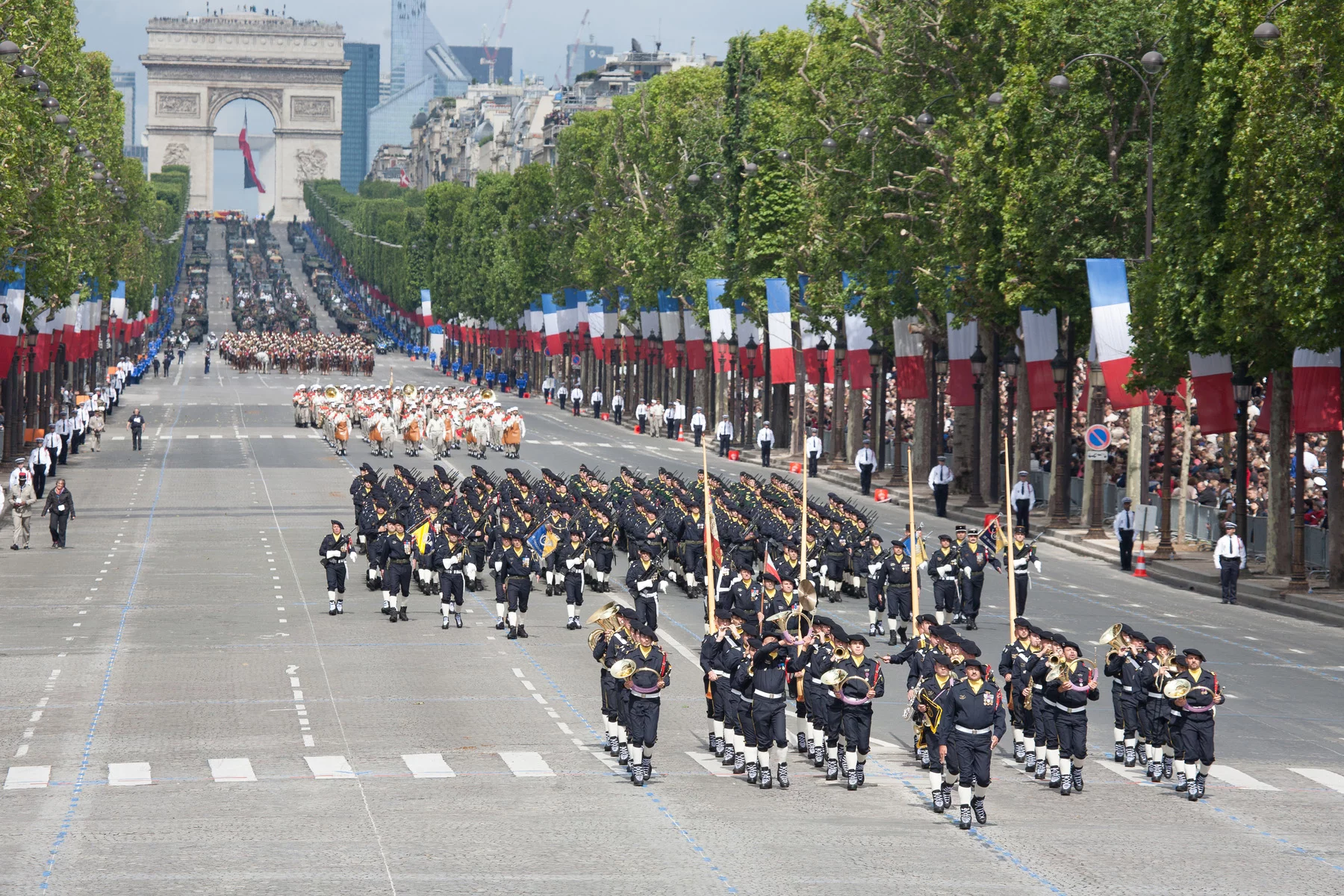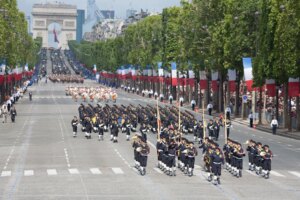Whether you’re enjoying a lavish dinner with friends or watching the fireworks displays at iconic landmarks, the French know how to make New Year’s Eve unforgettable. And while the countdown to midnight may bring the usual cheers and kisses, the holidays also hold unique traditions that make the festive season so special.
Ready to celebrate like the French? Here’s what you need to know:
Allianz Travel
Get insured for your next trip with Allianz Travel. A world-leader in travel insurance, their tailor-made plans will safeguard you on your trips within and beyond France. Whether you’re planning a weekend-getaway or moving your life overseas, have complete peace of mind wherever you go with Allianz Travel.
New Year’s Eve in France
As the year draws to a close, the French welcome the New Year with elegance and typical joie de vivre. On New Year’s Eve (la Saint-Sylvestre), family and friends rendezvous for an evening of food and celebration that stretches well into the early morning hours. Others head out to enjoy the nightlife at clubs and house parties.
While some cities do organize colorful fireworks displays, large-scale fireworks shows like those at the Eiffel Tower are often reserved for Bastille Day. Instead, many people mark the moment by setting off fireworks in the garden.

Celebrations will often go on until 03:00–04:00 in the morning when the house guest has left. New Year’s Day – 1 January – is a public holiday in France, one that’s typically spent relaxing at home or meeting loved ones for a hangover brunch. It’s also common to visit older relatives or friends to wish them a Happy New Year in person.
What are French New Year traditions?
Kissing under the mistletoe
While the world associates mistletoe (le gui) with Christmas, the French tradition is to have it out on New Year’s Eve. This plant holds special meaning in France, dating back to ancient times when the Druids considered it sacred. Today, you’ll find it decorating homes and dinner tables during the festive season, symbolizing renewal and new beginnings.
At the stroke of midnight, people share a kiss underneath to start the New Year on a lucky note. That’s because mistletoe is believed to bring good luck, prosperity, and happiness for the year ahead.
New Year’s swim
For some in France, the old year ends (or the new year begins) with an icy plunge into the sea. This chilly tradition is known as le bain de la Saint-Sylvestre (New Year’s Eve swim) or le bain du Nouvel An (New Year’s swim), depending on which day it takes place.

The custom varies by location, with some towns holding the swim on 31 December and others on 1 January. However, the goal is the same: to start the year with courage, energy, and vigor. If you’d also like to brave the frigid waters, one of the most popular beaches for this swim is that at Malo-les-Bains in Dunkirk.
Cards and gratuities
While other countries exchange holiday cards in December, the French save their best wishes for January. Sent to friends, family, and even business associates, these New Year cards (cartes de vœux) often carry wishes for health, happiness, and success in the year ahead.
It’s also traditional to offer New Year gratuities (les étrennes) to people who’ve made your year a little brighter. For example, household cleaners, postal workers, and apartment block concierges. People sometimes exchange gifts and tips for calendars that are sold door-to-door by firefighters, garbage collectors, or postal workers.
And in families, it’s common for children to receive étrennes from relatives. These often take the form of money tucked into an envelope.
Typical New Year food and drinks
In France, New Year’s Eve isn’t complete without le Réveillon. This is a lavish dinner party that’s as much about savoring good food as it is about celebrating with friends and family. While some opt for intimate dinners at home, others celebrate with a soirée dansante (dinner dance) at a restaurant, or host elaborate costume parties (soirées déguisées).
On New Year’s Eve, the menu is nothing short of spectacular. Tables are set with French delicacies and luxury foods like caviar, foie gras, oysters, smoked salmon, snails, and truffles. For the main course, favorites include game meats, roasted duck or goose, or even lobster.

Throughout the evening, glasses of champagne flow freely, ensuring the night sparkles as much as the holiday lights. And, of course, no dinner would be complete without an array of cheese and desserts. Common dinner closers include bûche de Noël (Yule Log), tarts, or meringue.
How to say Happy New Year in French
There are plenty of ways to wish someone a Happy New Year in French. Here are a few expressions you’ll hear as 31 December rolls around:
- Bonne année! – means “Happy New Year!” You can also add et bonne santé (and good health) or plein de bonheur et de succès (lots of happiness and success)
- Je vous souhaite une excellente année! – for more formal or professional settings, you could say, “I wish you an excellent year!”
- Meilleurs vœux pour la nouvelle année! – a polite way of saying “Best wishes for the New Year!”
- Tous mes voeux pour la Nouvelle Année! – typically used in New Year cards, this means “All my wishes for the New Year!”
- Que cette année t’apporte tout ce que tu souhaites! – translates to “May this year bring you everything you wish for!”
- Que cette nouvelle année soit remplie de joie et d’amour! – for a more heartfelt wish, you can say “May this new year be filled with joy and love!”
The French are not very big on exchanging New Year’s wishes, but it’s common to say “Bonne année!” well into the second week of January. It usually stops around 6 January (Epiphany). So, if you’re back at work or running errands after the holiday, remember to spread the good cheer for the year ahead.
Where to celebrate New Year’s in France?
When it comes to ringing in the New Year, France offers no shortage of spectacular destinations to celebrate in style. Whether you’re looking for dazzling lights, unforgettable parties, or a charming atmosphere, these three cities promise a night to remember.

New Year in Paris
Paris truly knows how to celebrate in style. The iconic Champs-Élysées transforms into the city’s party central, drawing large crowds to toast the year gone by and welcome the one ahead. With concerts and a dazzling light show projected onto the Arc de Triomphe, the countdown to midnight in the French capital is an experience to remember.
If you’re in the mood to dance until the early hours, renowned clubs like Le Duplex throw electrifying New Year’s Eve parties that will kickstart the new year in style.
Looking for something magical? Disneyland Paris offers a unique New Year’s experience, complete with late-night access to attractions, appearances from favorite Disney characters, and a breathtaking fireworks display to cap off the evening.
New Year in Nice
For a more laid-back but equally dazzling New Year’s Eve, Nice delivers a perfect mix of Riviera charm and lively festivities. Begin your evening with a leisurely stroll along the iconic Promenade des Anglais, where stunning coastal views set the mood for the night. Then, head into the Old Town, where vibrant parties and live music fill the winding streets with energy and excitement.
The city’s renowned culinary scene shines on New Year’s Eve, with many restaurants offering special menus featuring fresh seafood and Provençal wines, perfect for a festive feast.
And if you’re feeling adventurous, why not start the year with a splash? Join the locals for the New Year’s swim on 1 January.
New Year in Marseille
Marseille knows how to put on a show for New Year’s Eve, and the iconic Old Port (Vieux-Port) is the heart of the action. Expect live music, a vibrant atmosphere, and a spectacular fireworks display over the harbor as crowds gather to ring in the New Year.

For those looking to keep the party going, Marseille’s vibrant nightlife has you covered. Head to the trendy Cours Julien for an eclectic mix of bars and live music, or explore the chic docks area, where modern venues host all-night celebrations with DJs, cocktails, and dancing.
New Year’s Day in France
1 January (le Jour de l’An) is a quiet day in France, and stores are mostly closed. Many French people meet up with close friends and older relatives to wish them a happy New Year in person or finish off the festive leftovers.
For those seeking fresh air, some head to parks or cozy cafés to soak in the first calm moments of the year. Others use this day to dive headfirst into their life goals. New Year’s resolutions are quite popular in France, particularly those that focus on loved ones, money management, and health.
While New Year’s Day might be quiet, it’s just the calm before the next wave of celebrations begins. In some regions, the holiday season flows seamlessly into Carnival preparations, especially in areas like Dunkirk, Granvile, Limoux, and Nice. These pre-Lenten celebrations are a whirlwind of parades and performances that kick off in earnest later in the winter.
Practical tips for expats
French New Year’s can be a great experience, but if you’re new to the country, a little preparation goes a long way. Here are some tips to help you make the most of the evening:
- Keep an eye on the weather – New Year’s Eve in France typically falls in the middle of winter, so expect chilly temperatures. Be sure to dress in layers and pack gloves when you plan to stay out late. France can be wet in December, so bring an umbrella.
- Make reservations (way) in advance – many restaurants and events are booked weeks, if not months in advance. Be sure to make a reservation if you’re planning to go somewhere. Also, check up on the dress code so you can dress the part.
- Stay safe during fireworks – the French are subdued when it comes to fireworks on New Year’s Eve. However, it’s always important to keep a safe distance and watch your surroundings, especially in busy areas. For those who have pets, it might be wise to look into anxiety medication.
- Plan ahead for public transport – in larger cities, public transport usually runs all night to accommodate late-night revelers. In smaller towns, however, trains and buses often stop running by the early hours of 1 January. Check your local transport app and plan ahead if you need to get home. Don’t expect to hail a taxi easily – it’s a busy night for everyone.
- Businesses are closed on 1 January – many stores and supermarkets are closed on New Year’s Day. If you’re in need of essentials like breakfast or coffee, make sure you stock up beforehand.








